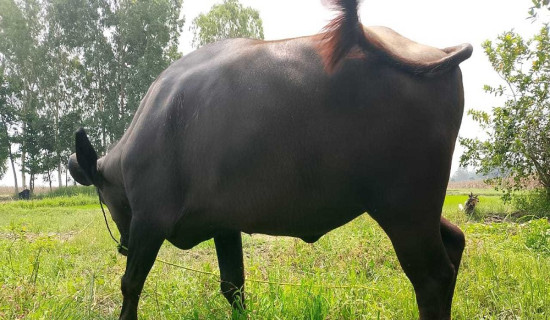- Thursday, 12 June 2025
President’s Election
Parties Look For Consensus Candidate
As the incumbent head of state's five-year term draws to a close on March 9, political parties represented in parliament are preparing for the upcoming presidential election. This election marks an interesting development in the nation's politics, as it has become evident that the fate of the current ruling alliance is tightly bound to who is chosen as the new president. This has caused considerable polarisation among the parties involved, making it difficult to predict what shape the alliance will take before and after this crucial vote. When the current coalition government led by Prime Minister Pushpa Kamal Dahal ‘Prachanda’ was formed, it was decided that the new president would be from the CPN-UML, which is the most prominent partner in the ruling alliance.
This understanding has now frayed as Prime Minister Prachanda favours a consensual candidate who does not belong to the UML. The Nepali Congress (NC), which had missed out on becoming a key part of the new government at the time due to its rigid stance, has now taken steps to prevent the UML's preferred candidate from being elected as president. After PM Prachanda mustered an impressive endorsement from parliament during his trust vote, thanks to unconditional backing from the NC, he seems more inclined towards accommodating the NC’s wishes, which has rattled UML chair KP Sharma Oli.
UML rattled
For backing the PM, Oli chastised the NC, claiming that it was done "to undermine the current coalition." The Congress's action has somewhat weakened the UML's grip on the ruling alliance, as PM Prachanda has used the NC’s support to look for a consensual candidate without fear of losing the UML's support for his government. Though he has not yet backed the NC candidate for president, the PM's growing proximity to the Congress has raised the UML's hackles.
The election for a new president has raised certain apprehensions in PM Prachanda and among a number of other political leaders. Their concerns stem from President Bidya Devi Bhandari's role in the political crisis two and a half years ago, when she openly supported the then prime minister Oli in his unconstitutional action of dissolving the Lower House of Federal Parliament. The constitution clearly states that the President is a ceremonial figure who must carry out his or her responsibilities within the parameters established by the national charter, but President Bhandari's role instilled fear in the hearts of our top leaders, compelling them to look for a non-UML candidate as the new president.
Another source of concern for parties is the likely concentration of power in the UML, which may hold main constitutional positions such as the President, Prime Minister, Speaker, powerful ministerial portfolios, and the majority of provincial administrations. More concerned about the UML's likely dominance, parties and their leaders are apprehensive about what might happen if UML chair Oli becomes the next Prime Minister, as agreed between him and the PM. The NC is currently moving heaven and earth to elect one of its senior members as president. It has sought to create schisms in the present ruling alliance over the presidential election. If it fails in this endeavour, it will push for a consensual candidate who is not a member of the UML.
PM Prachanda and his allies may prefer a candidate with no political ties but enjoys supports from most of the parties. His party is said to have seriously considered nominating a senior politician with no problematic records or experience for the presidency. In short, the NC, the Maoist Centre, CPN-Unified Socialist, Janata Samajbadi Party, and former Prime Minister Dr. Babu Ram Bhattarai appear to be on the same page — they want to nominate a non-UML candidate. However, Oli is not interested in any non-UML candidate. He has put pressure on the PM, stating he must honour the arrangement reached on December 25, when the UML backed the latter to get appointed as new PM after he split from the then-Nepali Congress-led alliance.
Consensual candidate
However, following the NC’s backing for him during the vote of confidence, Prachanda is once again cosying up to the Congress and is willing to listen to its wishes. The decision of political parties to opt for a president who is not a member of the UML appears to be justified when considering the current political climate and its potential effects on other parties in national politics, which is marked by a coalition culture at present, which has been an important part of the democratic process and must be respected for it. A single party holding all significant constitutional posts is thus potentially detrimental to this process and should be avoided if possible. The future will tell if other parties can resist the UML’s influence during elections and maintain their standing in national politics.
Finally, the UML-led alliance's longevity and role within the current government will be determined by PM Prachanda's overtures during nomination of new presidential candidate. If he endorses a candidate with national consensus or an independent, UML leader Oli may throw his support behind him. A candidate having national consensus may give the UML a face-saving for not being able to send its candidate as president as agreed earlier. However, if PM Prachanda backs an NC candidate for president, the largest party in the ruling coalition may reassess its relationship with him. There are several UML leaders who do not want to leave the government and desire to maintain the current coalition by supporting the PM’s idea of a consensual candidate. As many analysts believe, the survival of the present ruling coalition depends on what steps the UML takes regarding the new president.
(Upadhyay is the managing editor of this daily.)

















